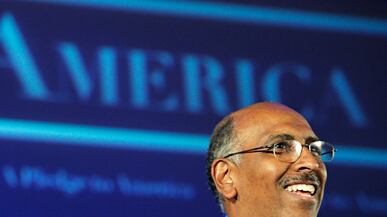The RNC will vote for a new chairman Friday. As the future of the party hangs in the balance, Michael Steele's colleagues offer mixed reviews of his gaffe-filled reign. Plus, meet Steele's challengers.
On Friday, Republican National Committee members will vote for a new party chairman—and things are not looking good for current Chairman Michael Steele. After a beleaguered term, albeit one in which Republicans came out victorious in the 2010 election, his future as the head of the RNC is uncertain.

As the first black Republican chairman’s term draws to a close, other black Republicans are offering mixed reviews of his gaffe-filled reign and the effect it will have on recruiting more African Americans to the GOP if he is not re-elected.
Raynard Jackson, a black GOP strategist and friend of Steele, says the chairman should be judged on how victorious the Republicans were in November and nothing else, but criticized Steele for not reaching out to black conservatives, a more important part of his administration. He said Steele made no serious efforts at reaching out, so not having him as head of the party won’t affect more blacks from joining the GOP.
“The problem is within the white structure within the Republican Party,” Jackson said. “People on the committee that I’ve talked to over the past few years in private conversations—and even elected officials—they were very careful of how they criticized Michael and, they won’t admit this, but because of his race.”
“The reason Republicans can’t get more blacks involved in the party is they keep pretending race and color doesn’t exist.”
Jackson criticized not only Steele, but his own party and said the entire GOP is doing a poor job of recruiting African Americans to the party and to run for office, “The reason Republicans can’t get more blacks involved in the party is they keep pretending race and color doesn’t exist.”
He said instead of telling blacks to join the Republican Party they should be reaching out to the community on issues like abortion, taxes, and the role government plays in their lives. Jackson says he’s told Steele this, but he hasn’t “done a good enough job.”
Ada Fisher, one of the two black delegates to the RNC, intends to vote for Maria Cino—and in fact didn’t vote for Steele the first time. She has been a strong critic of Steele’s since his 2008 campaign and soon after he was elected she started publicly criticizing him and even called for his resignation.
“People looked to Steele as being a counter to Barack Obama, and I think that was a wrong thing to do. We needed someone who could articulate the best interests of the party,” Fisher, the delegate from North Carolina, said. “He could talk ‘hip-hop’ until the cows come home, but he’s not going to bring so much of that to the party until we demonstrate that we can provide an avenue and a channel for that generation to have jobs.”
She added that Steele has not “proven” to her that he can do that, or that he has a “vision” for the future of the nation.
Still, in the 2010 election an unprecedented amount of African Americans ran on the GOP ticket: 42 in primaries, 14 in the general election, and two went on to win Congressional elections: Allen West of Florida and Tim Scott of South Carolina. Jennifer Carroll is also now the first black lieutenant governor of Florida.
For Rep. Allen West of Florida’s 22nd district, one of the two black Republicans now serving in the House, the sheer number of black Republicans that ran in the midterms means they have turned a great corner. But it’s not about Steele, it’s about the message, he said.
The sidelining of Steele will have no effect on more black Republicans running for office though, West said. “That would be just like me saying if Michael Steele wasn’t here would I have run? I think now the onus is upon people like myself, Tim Scott, and Jennifer Carroll to reach back and start developing that next generation of black conservative leaders. That is one of the ancillary missions that we have and I understand that.”
But Steele still has staunch supporters. Timothy F. Johnson, Chairman of the Frederick Douglass Foundation, a group that works to get black Republicans elected and recruited to the GOP, is a strong supporter of Steele’s. He acknowledges mistakes were made, but the electoral victories the party racked up in November should be what the delegates consider. He says that a loss for Steele would be a “kink in our armor,” and he’s still hopeful he will win.
“He’s been unfairly scrutinized,” Johnson said. “At the end of the day, without perhaps the hiccups mentioned over and over again, this wouldn’t be a conversation.”
The other black RNC delegate, Glenn McCall from South Carolina, is also not planning on voting for Steele. He said that all of the emails and phone calls he’s gotten from Republicans in his state are telling him not to vote for Steele. “The committee feels that we need a different person, someone with a different skill set to lead the organization as we go into 2012,” he said.
McCall, like Fisher, didn’t vote for Steele in 2008, either. He didn’t struggle with his decision because to him “it wasn’t based on color, it was based on qualifications and it still is.”
But many members wonder if Steele is trying to make the race about race. When he announced his surprise run for another term, he raised some eyebrows by saying, “Who you elect as our next chairman will speak volumes about our willingness to truly be the party of Lincoln."
James Bopp, a white RNC member from Indiana and prominent conservative attorney, was outraged. "This is the threat he has made by playing the race card—he will smear the RNC by saying we are all racist by not voting for him." Steele’s response: calling him an “idiot.”
McCall did not agree with Bopp, but said that he received numerous calls after the announcement from other delegates who did. If that was Steele’s goal, McCall says he wasn’t convinced, “If it was a subtle appeal based on race, I don’t buy that.”
Armstrong Williams, a black conservative radio host, said Steele’s re-election is “not a black or white” issue, and says real conservatives “don’t care about race.” He added that sometimes he looks at Steele now compared to when he was Maryland's lieutenant governor and wonders, “Where did that person go?”
“Overall he did a very decent job, but imagine what he could have done if he didn’t play the race card, which he did from time to time,” Williams said. “Imagine if he had not pursued the ‘hip-hop’ vote with nothing to show for it, imagine if he did not have the gaffes, imagine if he got spending under control…imagine what his legacy would be, and what he could have done. So it will be a mixed legacy of success, but also missed opportunities.”
And as for the “Party of Lincoln” line, he thought Steele was absolutely playing the race card.
“What he should have said was, ‘Support me, but please don’t support me because of some ridiculous race issue. Support me based on merit…success, delivery, and if you don’t feel I’ve done that, then you find a leader that you feel that can move us forward in the future,’” he said. “That’s what a leader would do.”
Shushannah Walshe covers politics for The Daily Beast. She is the co-author of Sarah From Alaska: The Sudden Rise and Brutal Education of a New Conservative Superstar. She was a reporter and producer at the Fox News Channel from August 2001 until the end of the 2008 presidential campaign.






